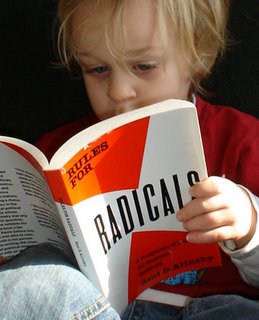The Potential for Disruptive Change in CPS
 Charlie is taking another nap. We went to Stuff and Gym at the YMCA. I had a discussion with a mom who was marveling at the amount of stay at home parents with advanced degrees. Anyway, Charlie and I returned home had some lunch and, yes another nap. This gave me time to read a great article and take a wonderful quiz on disruptive innovation. The article “Change or Die” by Micahel J. Petrilli is on the NRO website. Petrilli, vice president of national programs and policy at the Fordham Foundation, examines the promise of vouchers and charter schools as a reform mechanism for large urban bureaucracies. He finds that they are for the most part ineffective in this reform effort. He asks “What if some bureaucracies are so brain-dead, so dysfunctional, so entwined in special interests that they simply cannot respond to competition?” Instead of reform Petrilli appears to endorse the radical overthrow of the current educational bureaucracies that rule urban areas. He acknowledges that this will take time, but that if students learn better in charter schools or under voucher systems then it is only time before the bureaucracies go belly up. Finally someone, albeit a conservative, who gets it. One thing that bureaucracies excel at is preservation of the status quo. What happens if the bureaucracy attempts to co-opt the movement? Recently I attended a Teach for America alumni meeting at Harris Bank in Chicago. Although not a TFA alumnus, I went with a friend who put me on the guest list. CEO of the Chicago Public Schools, Arne Duncan spoke at this networking event. Ringing the room were a series of tables where charter schools had set up shop to recruit alumni. Duncan praised the efforts of Teach for America and endorsed their participation in Renaissance 2010—the education initiative to open up 100 new small schools throughout Chicago. Coincidently, the CPS Renaissance 2010 Office is run by TFA alumni. Duncan called TFA essential to the future of CPS. He spoke briefly about the need for Renaissance 2010. He was speaking to the choir. I found it interesting that the head of the third largest district in the country recognizes that the system as it exists is broken and bloated. It is a matter of time before the small schools replace the behemoths down the block. Vishnu is both destroyer and creator. Vishnuic reform would imply the dismantling of the bureaucracy before a new system could replace it. This is the problem with urban school districts---they want both the spirit of the charter school movement and the job security/inertia/shuffle the chairs on the Titanic mentality of preserving the status quo. If 1,000 teachers lose their jobs in CPS they should go out and form charter schools! Simply, they owe nothing to a system that has in some cases nailed them twice—don’t forget the 1,000 teachers who were cut last year. And of course the real irony is that the lousy teacher down the hall with 20 years experience kept his job while the go-getter third year, finally hitting my stride, teacher lost hers. But for those teachers to reinvest in a system that is broken, bloated, and impersonal is insane. Go, form a charter. Of course, the poorer teachers will balk at this because they view CPS as an employment agency. The better teachers will welcome the challenge and be able to see the fruits of their labors at work in small charter schools. Just for fun I took a Disruptive Innovation Quiz to see if CPS was ripe for disruptive innovation. It is. According to Professor Clayton Christensen at Harvard, disruptive innovations either “create new markets or reshape existing markets by delivering relatively simple, convenient, low cost innovations to a set of customers who are ignored by industry leaders.” Sounds good to me; Vishnu, your day is coming. |

Comments on "The Potential for Disruptive Change in CPS"
post a comment